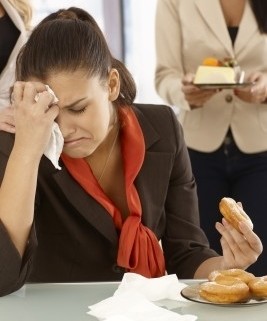3 Ways to Stop the Food Shaming
 Do you find yourself feeling “guilty” or “bad” after eating certain foods? Do you categorize these foods as ‘fattening” or “cheat meals”?
Do you find yourself feeling “guilty” or “bad” after eating certain foods? Do you categorize these foods as ‘fattening” or “cheat meals”?
Or are you the one judging others based on what they eat?
Either way, you may be experiencing food shame. The concept of classifying food as “good” or “bad” and then judging others, or yourself, based on what you eat is called food shaming. This can negatively impact your health.
Food-shaming is criticizing or judging someone (or yourself) for eating something that doesn’t match your definition of what food is “good”.
Examples of food shaming include judging your girlfriend for choosing pizza over a salad or making comments to your partner who has skipped breakfast, or shaming your colleague for being a vegetarian.
Food shaming can also be internal, when you shop at the grocery store and deprive yourself of buying ice cream because it’s “bad”, or you beat yourself up for purchasing the chips.
This is just a short list of the common types of food shaming that happens every day. The reality is that we need to watch what we are saying to others and to ourselves about food choices.
When You Shame Yourself for Your Food Choices
Judging yourself and speaking negatively about your food choices stems from influences and messages that you receive throughout life. These messages come early in life from parents and build throughout your years from the media, friends and even healthcare professionals.
Food shaming can lead to further problems down the road. Food shaming can create such a strong fear of what to eat that you become so rigid that you risk your physical and emotional health from either malnutrition, disordered eating, or eating disorders.
3 Ways to Stop the Food Shaming
- Embrace Intuitive Eating: Learning to break the spell that diets have over you and dismantling diet culture messages will help you relearn to trust your food choices again. Tuning into your physiological cues to eating is only one part of the journey. Developing a strong backbone to the culture you live in while learning to neutralize all foods will help you stop the food shaming.
- Acknowledge and Reframe Negative Self-Talk: When you find yourself going down the rabbit hole of negative self-talk around what you ate, immediately push pause, and recognize your inner critic at work. Let your inner critic know that you hear her but don’t value what she has to say any longer. Reframe into a more positive accurate statement that is aligned with who you are and the goals you have set forth for yourself.
- Remove All Judgement Around Food: When you label foods as “good” or “bad”, you essentially are giving power to these foods and placing them on a pedestal. This is why when you have a trigger and reach for these foods, you tend to overeat on them followed by judgement, guilt and shame. By removing the labels from all foods and taking the conditions off these foods, you neutralize them and they lose their allure.
Defend yourself from food shaming by breaking the cycle of dieting, stop labeling foods as good and bad, and reach out for support when you need it. You don’t have to do this alone!
Over time, you will find yourself more at peace with food so you can live your life to the fullest!





